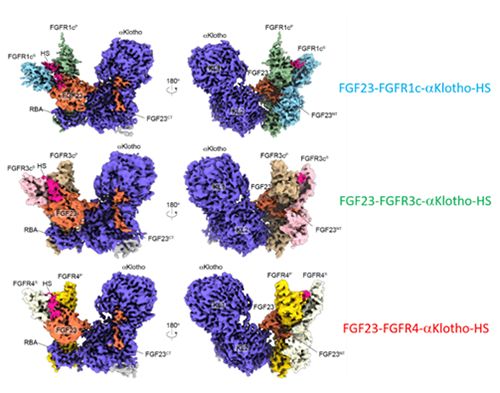
Figure. Overall view of the cryo-EM reconstructions of three FGF23-FGFR-αKlotho-HS quaternary complexes
Supported by the National Natural Science Foundation of China (Grant No. 82073705, 82273842 and 81930108), Prof. Xiaokun Li, Prof. Gaozhi Chen, and Prof. Moosa Mohammadi’s research groups from Wenzhou Medical University made progress in signal regulation mechanism of fibroblast growth factor. The related research was titled "Structural basis for FGF hormone signaling" and published in Nature recently. Article link: http://www.nature.com/articles/s41586-023-06155-9.
Metabolic disease is caused by the imbalance of sugar, fat, protein (amino acid) and other metabolic substances in the body, which seriously endangers the health of human beings. Fibroblast growth factor (FGF), an important endogenous regulatory protein family, not only regulates tissue regeneration, but also mediates the homeostasis of glucose and lipid metabolism. Thus, it is supposed to be an important molecule for the treatment of metabolic diseases such as diabetes. In the past few decades, symmetric dimer has been recognized as a classical model for FGF signaling which was formed by the interaction of two FGFs, two fibroblast growth factor receptors (FGFR), and heparan sulfate (HS) molecules. However, the drug discovery for the FGF related metabolic disease based on this symmetric model has never made a breakthrough.
This study reveals the molecular mechanism that αKlotho protein and HS act as co-receptors to mediate the binding of FGF to FGFR to form an asymmetric 1:2 FGF-FGFR dimer, and thereby activating downstream signaling pathways. This is the first time that fully showcased the molecular machine assembly and signal mechanism of FGF23, FGFR, αKlotho and HS quaternary complexes (Figure). The new model of FGFR activation discovered in this study has overturned our current symmetric model for FGFR dimerization and activation. Meanwhile, the new signal activation mode provides a new paradigm for the development of FGF related drugs for the treatment of metabolic diseases such as diabetes, obesity, chronic kidney disease, etc.

Add: 83 Shuangqing Rd., Haidian District, Beijing, China
Postcode: 100085
Tel: 86-10-62327001
Fax: 86-10-62327004
E-mail: bic@donnasnhdiary.org
京ICP备05002826号 文保网安备1101080035号 Copyright 2017 NSFC, All Right Reserved